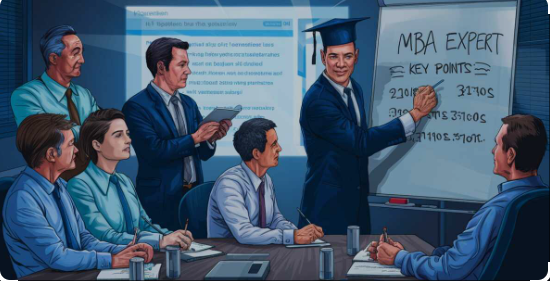For many experienced professionals, the question of why mba answer for experienced professionals-notesmama. With years of practical experience under your belt, you may wonder if going back to school is worth it. The answer lies in understanding how an MBA can amplify your existing skills and open doors to new opportunities. It’s not just about adding letters after your name; it’s about transforming your career trajectory and expanding your professional horizons.
Whether you’re eyeing a promotion, looking to pivot into a new industry, or simply seeking personal growth, an MBA could be the catalyst for change you need. Let’s dive deeper into why pursuing this degree might just be one of the best decisions you’ll ever make as a seasoned professional.
Benefits of pursuing an MBA as an experienced professional
Pursuing an MBA as an experienced professional opens new doors. It enhances leadership skills, preparing you for higher roles in your organization.
An MBA offers networking opportunities that can reshape your career. You connect with peers, professors, and industry leaders who can provide valuable insights and potential collaborations.
Additionally, the program often includes practical learning experiences. Real-world case studies allow you to apply theoretical knowledge directly to your current job challenges.
You also gain a broader business perspective. Understanding finance, marketing, operations, and strategy helps you make informed decisions that impact your company’s success.
Many employers value advanced degrees as they signify commitment and ambition. An MBA can distinguish you from other candidates when seeking promotions or new opportunities within competitive industries.
Things to consider before applying for an MBA program
Before diving into your MBA journey, take a moment to evaluate your career goals. Identify how an MBA aligns with where you see yourself in the future. This clarity will guide your decision-making process.
Next, consider the time commitment required. Balancing work, studies, and personal life can be challenging. Assess whether you prefer a full-time program or if a part-time or online option works better for you.
Financial aspects also play a crucial role. Determine how much you’re willing to invest and explore funding options like scholarships or employer sponsorships.
Think about the school’s culture and network. An environment that resonates with you can significantly impact your experience and opportunities post-graduation. Engaging with alumni before applying might provide valuable insights into what lies ahead.
How to make your
Crafting your MBA application requires a strategic approach. Start by understanding your unique experiences. Reflect on how they shaped your professional journey.
Next, think about what you want to achieve with an MBA. Identify specific skills or knowledge gaps that the program can fill for you.
Personalize each aspect of your application. Your essays should reflect authentic stories that highlight your leadership and problem-solving abilities. Admissions committees appreciate genuine narratives more than generic ones.
Networking plays a crucial role in this process. Connect with alumni or current students to gain insights into their experiences and gather tips for standing out.
Focus on showcasing growth through challenges faced in previous roles. This demonstrates resilience and adaptability, qualities highly valued in business leaders today.
Real-life examples of successful
Many seasoned professionals have transformed their careers through an MBA.
Take John, for instance. After spending a decade in engineering, he felt stagnant. Pursuing an MBA opened doors to management roles within his company, significantly boosting his salary and responsibilities.
Then there’s Lisa, who was entrenched in marketing for years. Her decision to enroll in an executive MBA program helped her pivot into entrepreneurship. She now runs a successful startup that focuses on sustainable products.
Consider Raj’s journey from finance analyst to CFO after completing his MBA. The program provided him with crucial networking opportunities and advanced financial strategies that propelled him up the corporate ladder.
These examples illustrate how an MBA can be a game-changer for experienced professionals looking to elevate their careers or explore new avenues. Each story underscores the versatility of skills gained during the program.
Common mistakes to avoid in your
When considering an MBA, many experienced professionals slip up on a few key points. One major mistake is neglecting to research programs thoroughly. Not all MBAs are created equal; specializations and cultures vary widely.
Another pitfall is underestimating the time commitment. Balancing work, study, and personal life can be challenging. It’s essential to have a realistic plan in place.
Networking often gets overlooked as well. Building connections during your program can open doors later on. Don’t wait until you’re at the finish line; start engaging early.
Avoid focusing solely on prestige or rankings. While reputation matters, finding a program that aligns with your career goals is more crucial for long-term success. Prioritize what truly matters for your professional journey rather than getting caught up in brand names alone.
Conclusion: The importance of a well-crafted
The importance of a well-crafted answer to the question, “Why MBA?” for experienced professionals cannot be overstated. It serves as your personal narrative that connects your past experiences with your future aspirations. A thoughtful response showcases your readiness for advanced learning and leadership roles.
An effective answer highlights how an MBA fits into your career goals while demonstrating self-awareness and strategic thinking. This not only strengthens your application but also sets the stage for meaningful discussions during interviews.
As you prepare this key component of your MBA journey, remember that authenticity is crucial. Tailor it to reflect who you are and where you want to go. The clarity in articulating why pursuing an MBA benefits both you and potential employers will resonate strongly throughout the admissions process.
Crafting a compelling narrative about why you’re seeking an MBA can open doors to opportunities previously thought unattainable. By linking professional experience with educational ambitions, you’ll position yourself as a motivated candidate ready to take on new challenges in today’s dynamic business landscape.
